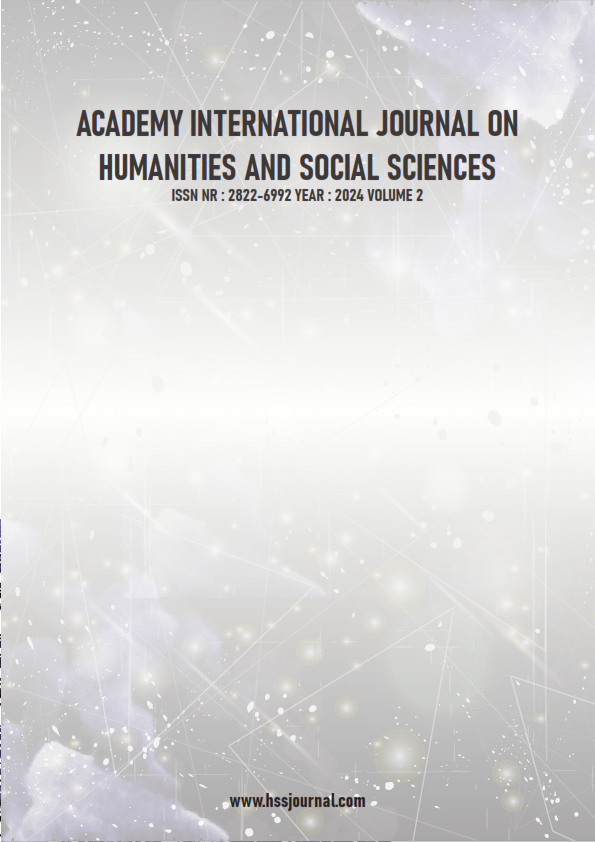MEMDUH ŞEVKET ESENDAL VE F. SCOTT FITZGERALD ÖYKÜLERİNDE SOSYAL KAYGILAR
DOI:
https://doi.org/10.5281/zenodo.14480843Abstract
The reality called life is a communication process based on every way by which two or more organisms or mechanisms interact with each other, on the exchange of verbal or written information. Communication may not always occur simultaneously and in the same context. For example, even centuries later, writers continue to exchange information with their readers through their texts. As a means of communication, stories are literary genres in which real or real-like events and situations are narrated without going into detail and constructed in a way that suits the message or messages that are intended to be given. Stories reflect both the spirit of the period in which the work was created and the author’s worldview, value judgments, inner world, the way s/he makes sense of the outside world, how the fictional world s/he presents relates to reality, and her/his concerns. They are works that are thought-provoking, emotional, have social, political and historical messages, and, like other literary texts, have a special place in the culture of the society to which they belong. Memduh Şevket Esendal (1884-1952) and F. Scott Fitzgerald (1896-1940), who have left their mark on the literary world with their stories, are writers who lived in the same period and reflected similar concerns in their stories.Both writers tried to describe the deterioration experienced by women of the period, and therefore in society in their stories. While comparing the female stereotypes of the old period with the new female stereotypes that emerged under the influence of westernization, Esendal expresses her personal ideas about how women should be. Fitzgerald, on the other hand, constantly depicts frivolous, money-oriented, and morally weak women in his stories, while emphasizing the negative changes in the social structure. This study aims to reflect the social panorama of two different societies of the same period while determining the social concerns of the two writers, by starting from Kızımız by Esendal and Winter Dreams by Fitzgerald, and supporting them with stories that deal with similar subjects.
References
Çetişli İ. Batı Edebiyatında Edebi Akımlar. Akçağ Yay. Ankara, 2012.
Çetişli, İ. Memduh Şevket Esendal. Akçağ Yay., Ankara, 2004.
Donaldson S. “Money and Marriage in Fitzgerald’s Stories”, Jackson R. Bryer, The Short Stories of F. Scott Fitzgerald New Approaches in Criticism, The University of Wisconsin Press, 1982.
Erden A. “Çağdaş Türk Öyküsünde Deneysellik, Yaratıcılık, Yeni Arayışlar ve Yönelimler”. Adam Öykü, S. 35, Temmuz-Ağustos, 2001.
Ergin, S. F. Scott Fitzgerald’ın İki Amerikası Yazarın Eserlerinde “Doğu” ve “Orta Batı” ikilemi. Ege Üniversitesi Edebiyat Fakültesi Yayınları No: 6. 1982.
Esendal M. Ş. Mendil Altında. Bilgi Yayınevi, İstanbul, 2012.
Fitzgerald F. S. The Jazz Age. New Direction Bibelot, New York, 1996.
Fitzgerald F. S. Tales of the Jazz Age. New York: Charles Scribner’s Sons, 1922.
Fitzgerald F. S. The Stories of F. Scott Fitzgerald: A Selection of 28 Stories with an Introduction by Malcolm Cowley. Charles Scribner’s Sons, New York, 1951.
İleri S. “Çağdaş Öykücülüğümüze Kısa Bir Bakış Türk Öykücülüğünün Genel Çizgileri”. Türk Dili Dergisi. Türk Öykücülüğü Özel Sayısı, (1975).
Esendal, M. Ş. Otlakçı Hikâyeler I. Bilgi Yay., Ankara, 2010.
Hartnett K. S. Zelda Fitzgerald and the Failure of the American Dream for Women. Peter Long, New York, 1991.
Hook A. Modern Fiction, F. Scott Fitzgerald. Great Britain, 1972.
Mangum B. A Fortune Yet Money in the Art of F. Scott Fitzgerald’s Short Stories. Garland Publishing, Inc. New York & London, 1991.
Mizener Arthur, (1972), Scott Fitzgerald, Great Britain.
Our American Century, Jazz Age, The 20s. Alexandria Virginia: Time Life Books, New York, 1998.
Pickering J. Çev. Ümare Yazar, “Zaman ve Kısa Hikâye”. Hece Öykü. Yıl 1, Haziran-Temmuz, 2004.
Pearce R. (Ed.) The Sayings of F. Scott Fitzgerald. London, 1995.

Downloads
Published
How to Cite
Issue
Section
License
Copyright (c) 2024 Academy International Journal of Humanities and Social Sciences

This work is licensed under a Creative Commons Attribution 4.0 International License.

